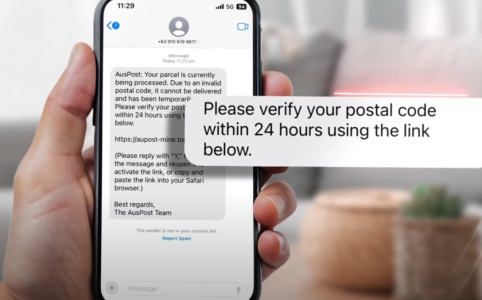Australia Post issues urgent scam alert every Aussie must know
By
Gian T
- Replies 0
If you’ve ever eagerly awaited a parcel delivery—perhaps a birthday gift for a grandchild, a new book, or even just your regular online shopping—you’ll know the anticipation (and sometimes frustration) that comes with tracking your package.
But now, Australia Post is warning that scammers are taking advantage of this excitement, and Aussies—especially older Australians—are being targeted in a fresh wave of sophisticated scams.
Australia Post has sounded the alarm about a new scam that’s rapidly spreading across the country.
This latest trick involves fraudulent messages—via text or email—claiming that your parcel delivery was unsuccessful due to an 'invalid postcode.'
The message then urges you to click a link to fix the issue.
But here’s the catch: that link doesn’t take you to the real Australia Post website.
Instead, it leads to a convincing fake page designed to steal your personal information.
Once scammers have your details, they can use them to access your accounts, steal your identity, or even trick you into sending money.
This isn’t just your run-of-the-mill dodgy email. The scam is part of a new wave of cybercrime known as 'phishing-as-a-service,' specifically using a toolkit called 'Darcula.'
This toolkit allows scammers to easily impersonate trusted brands like Australia Post, making their messages look frighteningly real.
What’s even more concerning is that these scams can bypass many of the usual security filters, reaching you through iMessage and Rich Communication Services (RCS)—the same channels you use to chat with family and friends.
That means even the most tech-savvy among us can be caught off guard.
According to new research from Australia Post, a staggering nine in ten Australians have received a scam text or call.
Nearly three-quarters of us have been targeted by scams pretending to be from parcel delivery services.
And it’s not just a minor annoyance—85 per cent of Aussies say they’re more worried about scams now than they were just a year ago.
Worryingly, the research also found that only 10 per cent of Australians aged 80 and over feel 'very confident' in spotting scams, compared to 36 per cent of Gen Z.
Most older Australians say they’re only 'somewhat confident,' which means we need to be extra vigilant.
Australia Post wants to reassure customers that they will never call, text, or email you asking for personal or financial information—like your password, credit card details, or account information.
If you ever receive a message like this, it’s a red flag.
To help keep you safe, Australia Post recommends using their official AusPost app.
The app is a secure way to track your parcels, receive delivery updates, and even redirect packages to a parcel locker or another address.
You’ll also get in-app notifications for missed deliveries—so there’s no need to click on suspicious links or respond to unexpected messages.
To stay safe, avoid clicking on suspicious links—if you get a message about a missed delivery, check the official AusPost app or website directly.
Never share personal information, as Australia Post will not ask for your password, credit card, or bank details through text, email, or phone.
Be cautious of urgent messages, as scammers often use urgency to pressure you into acting without thinking.
If you receive anything suspicious, report it to Australia Post and delete the message right away.
Also, keep your devices updated with the latest security patches to protect against threats.
If you think you may have accidentally given your details to a scammer, don’t panic—but act quickly.
Contact your bank or financial institution immediately, and let Australia Post know what’s happened.
You can also report scams to the Australian Competition and Consumer Commission (ACCC) via the Scamwatch website.
Scams are becoming more sophisticated, but by staying informed and cautious, you can protect yourself and your loved ones.
Remember, if something doesn’t feel right, it probably isn’t. When in doubt, check with Australia Post using their official app or website.
Credit: YouTube

Have you received a suspicious message about a parcel delivery? How do you stay safe online? Share your experiences and tips in the comments below—let’s help each other stay scam-free.
But now, Australia Post is warning that scammers are taking advantage of this excitement, and Aussies—especially older Australians—are being targeted in a fresh wave of sophisticated scams.
Australia Post has sounded the alarm about a new scam that’s rapidly spreading across the country.
This latest trick involves fraudulent messages—via text or email—claiming that your parcel delivery was unsuccessful due to an 'invalid postcode.'
The message then urges you to click a link to fix the issue.
But here’s the catch: that link doesn’t take you to the real Australia Post website.
Instead, it leads to a convincing fake page designed to steal your personal information.
Once scammers have your details, they can use them to access your accounts, steal your identity, or even trick you into sending money.
This isn’t just your run-of-the-mill dodgy email. The scam is part of a new wave of cybercrime known as 'phishing-as-a-service,' specifically using a toolkit called 'Darcula.'
This toolkit allows scammers to easily impersonate trusted brands like Australia Post, making their messages look frighteningly real.
What’s even more concerning is that these scams can bypass many of the usual security filters, reaching you through iMessage and Rich Communication Services (RCS)—the same channels you use to chat with family and friends.
That means even the most tech-savvy among us can be caught off guard.
According to new research from Australia Post, a staggering nine in ten Australians have received a scam text or call.
Nearly three-quarters of us have been targeted by scams pretending to be from parcel delivery services.
Worryingly, the research also found that only 10 per cent of Australians aged 80 and over feel 'very confident' in spotting scams, compared to 36 per cent of Gen Z.
Most older Australians say they’re only 'somewhat confident,' which means we need to be extra vigilant.
Australia Post wants to reassure customers that they will never call, text, or email you asking for personal or financial information—like your password, credit card details, or account information.
If you ever receive a message like this, it’s a red flag.
To help keep you safe, Australia Post recommends using their official AusPost app.
The app is a secure way to track your parcels, receive delivery updates, and even redirect packages to a parcel locker or another address.
You’ll also get in-app notifications for missed deliveries—so there’s no need to click on suspicious links or respond to unexpected messages.
To stay safe, avoid clicking on suspicious links—if you get a message about a missed delivery, check the official AusPost app or website directly.
Never share personal information, as Australia Post will not ask for your password, credit card, or bank details through text, email, or phone.
Be cautious of urgent messages, as scammers often use urgency to pressure you into acting without thinking.
If you receive anything suspicious, report it to Australia Post and delete the message right away.
If you think you may have accidentally given your details to a scammer, don’t panic—but act quickly.
Contact your bank or financial institution immediately, and let Australia Post know what’s happened.
You can also report scams to the Australian Competition and Consumer Commission (ACCC) via the Scamwatch website.
Scams are becoming more sophisticated, but by staying informed and cautious, you can protect yourself and your loved ones.
Remember, if something doesn’t feel right, it probably isn’t. When in doubt, check with Australia Post using their official app or website.
Credit: YouTube
Key Takeaways
- Australia Post has issued an urgent warning about a new scam where fraudulent messages claiming to be from Australia Post ask customers to click a link to fix a supposed 'invalid postcode' issue with package delivery.
- The link in these scam messages leads to a fake website that collects personal information, which scammers then use to steal credentials or trick people into sending money.
- The latest scam uses a cybercrime toolkit called ‘Darcula’, making it easier for scammers to impersonate trusted brands and bypass usual filters, even sending scam messages through iMessage and RCS.
- Australia Post advises customers only to trust notifications and parcel updates provided via the official AusPost app and reminds everyone they will never call, text, or email asking for personal or payment details.








